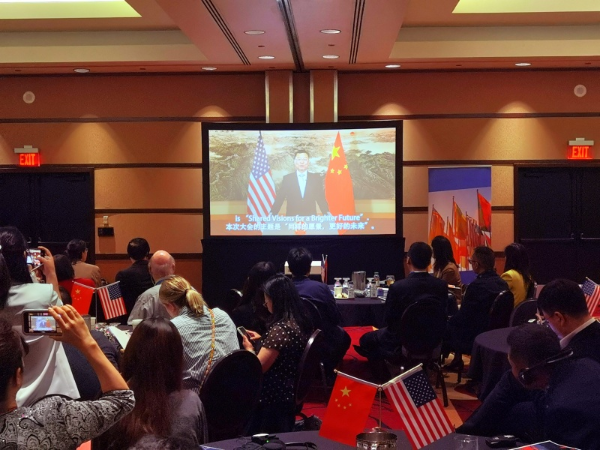
Chinese Ambassador to the United States Xie Feng told nearly 300 participants at the opening ceremony of the sixth China-US Sister Cities Summit that over the past 45 years, the relationships "have nurtured goodwill between the two peoples and injected vigor into China-US relations".
Speaking via video link on July 19, Xie extended congratulations on the successful convening of the summit in the port city of Tacoma, Washington.
The event brought together representatives from 14 Chinese provinces and 21 US states. They exchanged insights and discussed common challenges affecting both nations.
Xie said China-US sister-city relationships have continued to grow, noting that there are 286 pairs of sister provinces/states and sister cities.
In 1979, Hubei province in Central China and the state of Ohio became the first sister province/state, and Nanjing and St. Louis, Missouri, forged the first sister-city relationship, marking the start of friendly exchanges at subnational levels.
Xie said that China-US relations are still facing grave challenges and encouraged all to pool their strength to improve the relationship.
"As China and the United States celebrate the 45th anniversary of diplomatic ties this year, it is hoped that all participants will continue participating in and supporting sister-city cooperation and make greater contributions to turning the San Francisco vision into reality and ensuring the stable, sound and sustainable development of China-US relations," he said.
Xie shared three proposals for boosting subnational cooperation.
He encouraged the participants to seize the historical opportunities unleashed by China's openness and development, tap the large potential of China-US subnational cooperation based on complementarity, and promote common development for the well-being of the two peoples.
"Rick Snyder, former Michigan governor, had visited China eight times, more than any other US governor. With the visits, he brought back Chinese investment of $1.2 billion and more than 6,300 jobs for the state," Xie said.
"Today, China is the top export market for three US states, in the top three markets for 32, and in the top five for 43. Such subnational cooperation is mutually beneficial and has yielded fruitful outcomes," the ambassador said.
He said that China just held the third plenary session of the 20th CPC Central Committee in Beijing, sending a strong message of further deepening reform and advancing Chinese modernization.
He said there are new challenges facing subnational exchanges.
"In recent years, the so-called 'political correctness' of being tough on China has been spreading in the United States, casting a chilling effect on sister-city cooperation and subnational interactions," Xie said. "But the friendship between our two peoples is deeply rooted in our long history of exchanges. Neither setbacks in bilateral relations nor headwinds against people-to-people connections will ever change the fundamental wish of our peoples for friendship and cooperation."
Since the start of last year, more than 10 subnational delegations from the United States have traveled to China, and more than 30 delegations from Chinese provinces and cities have visited the United States.
Xie said all the trips have helped stabilize the China-US relationship, and he encouraged the two sides to conduct more visits, contacts and exchanges, "so that drop by drop, they can thaw the ice of misunderstanding and ultimately form a vast ocean of friendship between the two peoples".
Xie stressed the importance of adding new dimensions to sister-city relationships and said that from trade in agricultural products like soybeans and lobsters, to subnational climate action for green and low-carbon growth, and to smart-city building and the innovation economy, China-US sister-city cooperation is happening on diverse platforms and in increasing areas.
The ambassador continued: "We hope our sister cities will further enrich their cooperation in more forms. For instance, they are most welcome to be part of President Xi Jinping's initiative of inviting 50,000 American teenagers to China for exchanges or study in the next five years, to explore cooperation between the Guangdong-Hong Kong-Macao Greater Bay Area, the San Francisco Bay Area and the New York Bay Area, and between the Yangtze River Economic Belt and the Mississippi River area, and to hold events such as the China-US Agriculture Roundtable and the China-US Bay to Bay Dialogue. In this way, we can further expand and grow our sister-city relationships."
US Ambassador to China Nicholas Burns also sent his congratulations to the summit.
"Sister cities' relationships spur investment, expand exchanges in education and culture, and encourage people to learn more about their counterpart cities through tourism," said Burns. He said "it is heartening" that so many Americans and Chinese are gathering in Tacoma for "reinvigorating and expanding the people-to-people connections".
The sixth China-US Sister Cities Summit, themed "Shared Visions for a Brighter Future", was co-hosted by the Chinese People's Association for Friendship with Foreign Countries (CPAFFC) and the Sister Cities International (SCI) of the United States.
CPAFFC President Yang Wanming, SCI Chair Carlo Capua, Consul General of China in San Francisco Zhang Jianmin, and Tacoma Mayor Victoria Woodards attended the opening ceremony. Washington state Representative Derek Kilmer and others sent congratulatory letters.










